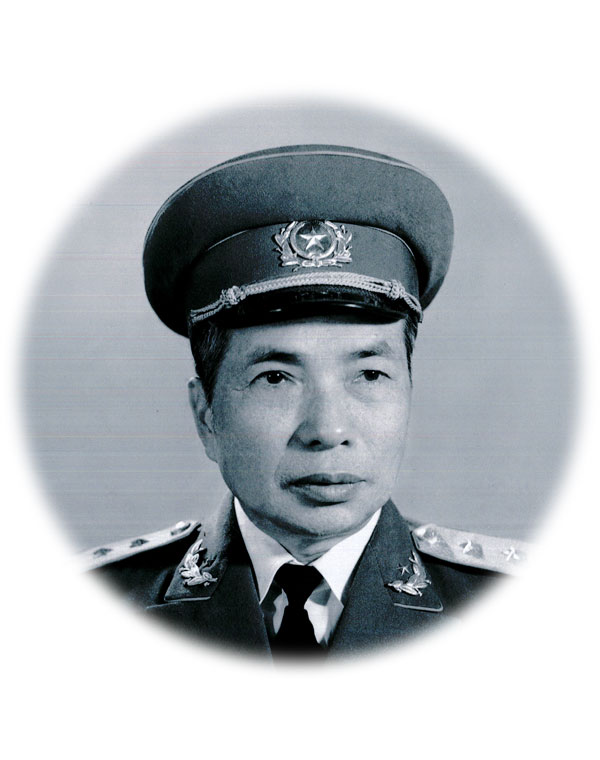


- Proper name: Nguyễn Văn Khương
- Native place: Liên Minh commune, Vụ Bản district, Nam
Định province
- Positions: Standing officer of the military commission of the
party central committee, Chairman of the Head Department
of Politics, Deputy Secretary of the military commission of the
party central committee, Deputy Minister of National Defense
During the resistance war against the US, he and his
comrades led the Ministry of National Defense to build a
strong army in all aspects, especially in politics, enhance
strength of people in fighting for the final victory in the
anti-American resistance to defend the country.


Soon understanding that the saving of the country had to depend on communist ideals, he actively participated in revolutionary activities in the Popular Front Movement in his homeland. In April 1939, he was admitted to the Indochinese Communist Party.
Photo: Comrade Song Hào, the photo was taken not very long after he joined revolutionary activities
SHOW
Being captured by the French colonialists and sentenced to 7 years in prison, he always looked forward to returning to people
and the Party, so he managed to escape from Chợ Chu prison, Thái Nguyên (in 1944).
“We had to get out of there, we had to find a way to get out and continued our revolutionary activities!
..In that "jailbreak" autumn night, it was already getting cold, but we felt very warm inside”.
Photo: Comrade Song Hao was imprisoned by the French colonialists in a colonial prison

After being sent by the Party Central Committee to join the army in 1947, he, along with comrade Võ Nguyên Giáp, during the 9 years of resistance against the French, established the ATK zone into a powerful strategic base.
Photo: Comrade Song Hào in Tuyên Quang, 1947


As a talented negotiator, he and comrade Văn Tiến Dũng were assigned by the Party and Uncle Hồ to attend the Trung Giã military conference on the ceasefire and restoration of peace in Indochina.
Photo: Comrade Song Hào attended the Trung Giã Conference, July 1954
Source: Life

Comrade Song Hào (sitting next to Uncle Hồ) - Political Commissar of 308 Battalion - Assault Corps and other cadres listened to Uncle Hồ’s advice before the Battalion returned to take over the capital, September 19, 1954

In 1961, he was elected as the Head of the General Political Department of the Vietnam People's Army. He always considered "political work as a basic principle” that helps to build a stronger revolutionary army to complete all assigned tasks.
Photo: Comrade Song Hào talked with Uncle Hồ at the General Political Department

Comrade Song Hào, Head of the General Political Department (front row, third person from the left) and a delegation on a business trip to Military Zone 4, 1965
Source: Vietnam People's Army

Senior Lieutenant General Song Hào was once called by Uncle Hồ "Bindweed General". It is because once Uncle Hồ visited his house, he saw a lot of bindweed in his small garden and also because he always had a simple lifestyle and always cared about his comrades.
Photo: Comrade Song Hào (5th person in the first row as seen from the right) and delegates attending
the Conference on force building and political work of local soldiers and militia, 1970.
Source: Senior General's family

Trusted by the Party Central Committee, the Central Military Commission and the General Command, in August 1972 he was appointed Political Commissar, Secretary of the Party Committee of the Trị-Thiên Campaign, he made a significant contribution to the victory at the Paris Agreement in 1973
Photo: Lieutenant General Song Hào and his unit marched to the B5 battlefield, 1972

Comrade Song Hào (third person in front row as seen from the right) had a group photo taken with officers of Trị-Thiên Front Command, 1972

Lieutenant General Song Hào, Head of the General Political Department and B5 front officers discussed the battle plan, 1972

During the Spring 1975 General Offensive and Uprising, as Director of the General Political Department, Deputy Secretary of the Military Commission of the Party Central Committee, Deputy Minister of National Defense, he contributed ideas in approving the strategy to liberate the South in two years 1975-1976 and the plan “If the opportunity comes in early or late 1975, we must liberate the South in 1975".
Photo: Secretary of the Military Commission of the Party Central Committee Võ Nguyên Giáp and Deputy Secretary of the Military Commission of the Party Central Committee Song Hào

Comrade Song Hào (sitting next to General Võ Nguyên Giáp) in a meeting with comrades of the Military Commission of the Party Central Committee's Standing Committee

Senior Lieutenant-General Song Hào (3rd person as seen from the right), comrades in the Military Commission of the Party Central Committee and the High Command monitored the developments of the Hồ Chí Minh campaign at Headquarters, April 1975.
